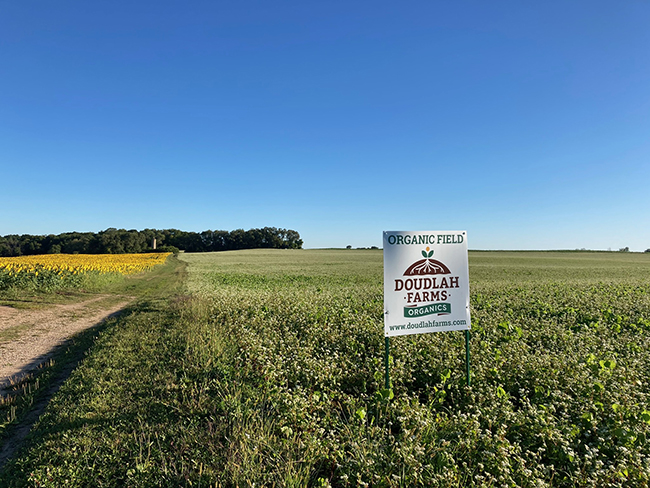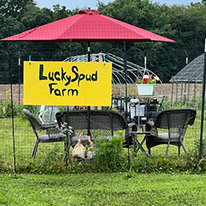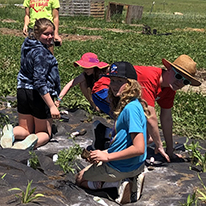Owner: Mark Doudlah
What they grow: Over 20 varieties of USDA Certified Organic beans, grains, and seeds, plus several kinds of honey.
Where you can buy from Doudlah Farms: Local groceries and health food stores, CSAs, and online at www.doudlahfarms.com. Visit their website for a list of organic products.

The Doudlah Farms family: wife Lucy, daughter Emily, Mark, and son Jason
At Doudlah Farms Organics, Mark and his family believe in wholesome, nutritious foods, farmed using regenerative and organic practices. Doudlah Farms Organics consists of 1,625 acres of farmland in Dane and Rock Counties. Mark’s strategy has been to complete the transition from conventional growing to organic certification by USDA and MOSA on all the acres he owns and leases. Mark, a sixth-generation farmer who began farming in 1982, has become a lifelong conservationist and advocate for organic, regenerative, and biodynamic farming practices (Fancy names for growing nutrient-rich food that’s good for people and the planet). This is a 24/7/365 job, in which his wife Lucy and son Jason play a big part as well.
Mark was inspired to dedicate his life’s work to the relationship between soil health, plant health, and human health by his father and mentor, Earl Doudlah. When Earl was diagnosed in 2008 and passed away from Mantel Cell Lymphoma in 2011, a cancer that was likely due to long-term exposure to farm-related chemicals, Mark witnessed first-hand how conventional agriculture fails to support the health of people and our planet. Mark committed to switching to organic farming practices in his dad’s honor.
Mark had already established himself as a local organic grower and educator when the Silverwood Park Board contacted him about leasing acreage at the newly established park. They found a great fit between the park’s agriculture and education missions, the other growers already on-site, and Mark’s interest in organic and regenerative practices. A partnership was formed in 2015 that has blossomed “literally” into approximately 137 acres. All will be 100% Certified Organic in spring 2021.
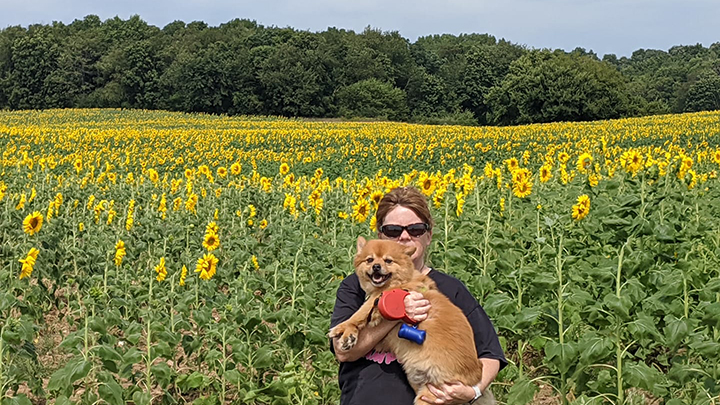
Jame Lee and friend at Silverwood Park, among the Doudlah sunflower acreage
If you had the pleasure of visiting Silverwood Park in late summer 2020, you saw Doudlah Farms Organics’ acres of yellow sunflowers and white buckwheat blossoms. The sunflowers seeds are currently being roasted and salted for packaging as healthy organic snacks for sale through the Doudlah Farms Organic Food Program. Mark will also have some of the sunflower seeds pressed for organic oil because the variety he planted is high in linoleic acid, which is considered very heart-healthy. The buckwheat harvest will be milled into gluten-free buckwheat flour. Beehives strategically placed to pollinate and feed on Marks crops are producing a variety of kinds of honey for sale as well.

You may have noticed the buffers of prairie plants around the borders of Marks field and a newly planted prairie strip on one of the high spots of Silverwood Park. “We’re in an ocean of GMOs and chemical spraying,” Mark explained, due to the conventional agricultural practices of farmers surrounding the park (and Mark’s other organic fields). Beautiful and beneficial, pollinator strip borders and mown grass walking paths are a great solution that keeps chemicals from infiltrating the organic crops and provides healthy habitat for humans, butterflies, and bees.
Mark studies each farm parcel’s characteristics and soil types to determine which crops are likely to thrive. His acres at Silverwood Park occupy the highest area of the terminal moraine that comprises the east part of the park. “Our plan for 2021 will be to plant pinto beans there, due to the drier field and somewhat shallow soil. Pinto beans like their feet drier, unlike some of the other beans we grow,” Mark said. Crop rotations are always changing to adapt to soil types, weather patterns, and diversity that supports soil health.
Weather is another challenge that directly affects organic farmers. Wet years spur outbreaks of weeds and pests. The specialized equipment required to control them represents a huge challenge in both expense and workload. Mark’s goal is to use no-till organics to regenerate the soil, but that is a work in progress that requires finding the right cover crop sequence. Organic food farming requires knowledge of soil types, plant types, weed control, pests, crop rotation, and a vast array of equipment and its uses.
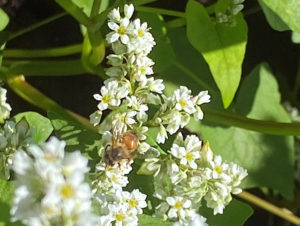
Turning a profit from an organic operation does not happen overnight. “The first three years can be negative profitability as you transition,” Mark explained. “It takes seven years to turn the corner and hopefully start making some profit.” Why? The first three years require organic practices, but the harvest must sell in the conventional market, making for a losing profit margin. In subsequent years, farmers play catch-up until finally reaching the financial breakeven point. Transitioning from conventional to organic farming is a huge undertaking, “but well worth it for your health, the earth, and our next generations,” Mark said.
“Grow food, not feed,” sums up the Doudlah Farms philosophy. “The consumer is the farmer’s new boss,” Mark believes. “We want to support our local food economy and to play a part in educating consumers about nutrition, where healthy food comes from, and how it is grown.” When Silverwood Park hosted Permaculture Field Days, Mark enjoyed showcasing how he farms organically without pesticides. Mark looks forward to doing more with school programs and other educational efforts at the park.
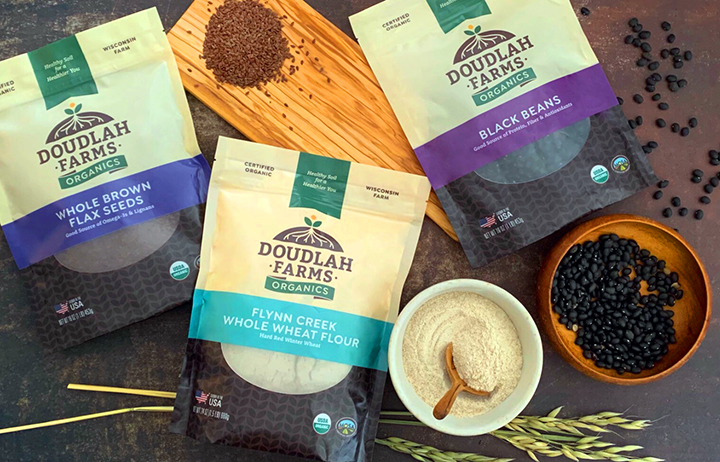
To enhance profitability, Mark plans to increase the ways he can sell via e-commerce. Doudlah Farms Organics sells straight to retailers, wholesalers and consumers via his website. Mark is also offering wholesale prices to CSAs to help them earn more per customer while rounding out the pantry staples they offer.
Mark said, “It is an honor to do the right thing for the right reasons, in partnership with like-minded people, including others in the grower program and the volunteers who join the Friends of Silverwood Park.”
Interview by Sarah White.

